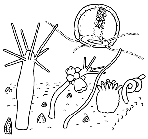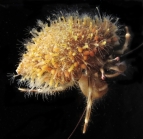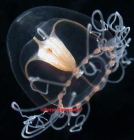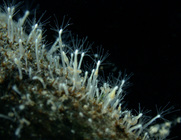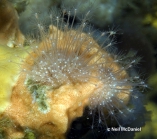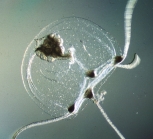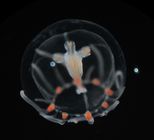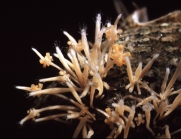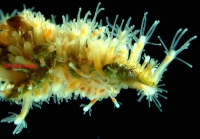WoRMS taxon details
Hydractiniidae L. Agassiz, 1862
1601 (urn:lsid:marinespecies.org:taxname:1601)
accepted
Family
Clavidae McCrady, 1859 · unaccepted > junior subjective synonym
Janariidae Stechow, 1921 · unaccepted > junior subjective synonym
- Genus Bouillonactinia Miglietta, McNally & Cunningham, 2010
- Genus Clava Gmelin, 1791
- Genus Clavactinia Thornely, 1904
- Genus Cnidostoma Vanhöffen, 1911
- Genus Distichozoon Cairns, 2015
- Genus Fiordlandia Schuchert, 1996
- Genus Hydractinia Van Beneden, 1844
- Genus Hydrissa Stechow, 1921
- Genus Hydrocorella Stechow, 1921
- Genus Janaria Stechow, 1921
- Genus Latebrahydra Calder & Watling, 2021
- Genus Oorhiza Mereschowsky, 1878
- Genus Parahydractinia Xu & Huang, 2006
- Genus Podocoryna M. Sars, 1846
- Genus Schuchertinia Miglietta, McNally & Cunningham, 2010
- Genus Stylactis Allman, 1864
- Genus Archaeoceania Picard & Rahm, 1954 accepted as Cnidostoma Vanhöffen, 1911 (synonym)
- Genus Calycidion Fewkes, 1882 accepted as Podocoryna M. Sars, 1846 (synonym)
- Genus Cionistes Wright, 1861 accepted as Hydractinia Van Beneden, 1844 (synonym)
- Genus Corynopsis Allman, 1864 accepted as Podocoryna M. Sars, 1846 (synonym)
- Genus Cytaeandra Haeckel, 1879 accepted as Podocoryna M. Sars, 1846 (synonym)
- Genus Dysmorphosa Philippi, 1842 accepted as Podocoryna M. Sars, 1846 (synonym)
- Genus Echinochorium Hassall, 1841 accepted as Hydractinia Van Beneden, 1844 (unaccepted > junior subjective synonym)
- Genus Halorhiza Stechow, 1962 accepted as Hydractinia Van Beneden, 1844
- Genus Hydractomma Stechow, 1921 accepted as Podocoryna M. Sars, 1846 (unaccepted > junior subjective synonym)
- Genus Hydrodendrium Nutting, 1906 accepted as Hydractinia Van Beneden, 1844 (synonym)
- Genus Hydronema Stechow, 1921 accepted as Hydractinia Van Beneden, 1844 (invalid junior homonym of Hydronema Martynow, 1914 [Trichoptera])
- Genus Nuttingia Stechow, 1909 accepted as Hydractinia Van Beneden, 1844 (invalid replacement name for Hydrodendrium Nutting, 1905)
- Genus Podocorella Stechow, 1921 accepted as Hydractinia Van Beneden, 1844
- Genus Podocoryne Lütken, 1850 accepted as Podocoryna M. Sars, 1846 (unaccepted > misspelling - incorrect subsequent spelling)
- Genus Polyhydra Stechow, 1962 accepted as Hydrocorella Stechow, 1921 (unaccepted > junior subjective synonym)
- Genus Rhizocline Allman, 1864 accepted as Podocoryna M. Sars, 1846 (synonym)
- Genus Stylactaria Stechow, 1921 accepted as Stylactis Allman, 1864 (synonym)
- Genus Styllactis Allman, 1864 accepted as Stylactis Allman, 1864 (unaccepted > misspelling - incorrect subsequent spelling)
- Genus Synhydra Quatrefages, 1843 accepted as Hydractinia Van Beneden, 1844 (not in use)
marine, brackish, fresh, terrestrial
recent + fossil
Agassiz, L. (1862). Contributions to the natural history of the United States of America. <em>Little Brown, Boston.</em> 4: 1-380, pls 1-19., available online at https://www.biodiversitylibrary.org/page/16068829
page(s): 339 [details]
page(s): 339 [details]
Taxonomy Several genera of the Hydractiniidae have been redefined by Miglietta et al (2010, 2012) based on molecular phylogenies....
Taxonomy Several genera of the Hydractiniidae have been redefined by Miglietta et al (2010, 2012) based on molecular phylogenies. Many of these genera are now not diagnosable by morphological traits. Moreover, not all species were included in the phylogeny and thus for some Hydractinia species it is unclear to which genus they belong. If it is unclear to what genus a hydractiniid species belongs, then Hydractinia should be selected as default. More revisory work is clearly needed to obtain a stable system [details]
Schuchert, P. (2024). World Hydrozoa Database. Hydractiniidae L. Agassiz, 1862. Accessed through: World Register of Marine Species at: https://www.marinespecies.org/aphia.php?p=taxdetails&id=1601 on 2024-11-21
Date
action
by
2004-12-21 15:54:05Z
created
db_admin
![]() The webpage text is licensed under a Creative Commons Attribution 4.0 License
The webpage text is licensed under a Creative Commons Attribution 4.0 License
original description
Agassiz, L. (1862). Contributions to the natural history of the United States of America. <em>Little Brown, Boston.</em> 4: 1-380, pls 1-19., available online at https://www.biodiversitylibrary.org/page/16068829
page(s): 339 [details]
original description (of Janariidae Stechow, 1921) Stechow E. (1921c). Neue Gruppen skelettbildender Hydrozoen und Verwandtschaftsbeziehungen rezenter und fossiler Formen. <em>Verhandlungen der deutschen zoologischen Gesellschaft.</em> 26: 29-31., available online at https://www.biodiversitylibrary.org/page/47281896
page(s): 30 [details]
original description (of Clavidae McCrady, 1859) McCrady, J. 1859. Gymnopthalmata of Charleston Harbor. Proceedings of the Elliott Society of Natural History 1: 103-221, pls 8-12. , available online at https://www.biodiversitylibrary.org/page/42536587
page(s): 123 [details]
context source (Hexacorallia) Fautin, Daphne G. (2013). Hexacorallians of the World. (look up in IMIS) [details]
basis of record Bouillon, J.; Boero, F. (2000). Synopsis of the families and genera of the Hydromedusae of the world, with a list of the worldwide species. <i>Thalassia Salent. 24</i>: 47-296 (look up in IMIS) [details]
redescription Schuchert, P. (2008). The European athecate hydroids and their medusae (Hydrozoa, Cnidaria): Filifera part 3. <em>Revue suisse de Zoologie.</em> 115: 221-302., available online at https://www.biodiversitylibrary.org/page/41183893
page(s): 223 [details]
page(s): 339 [details]
original description (of Janariidae Stechow, 1921) Stechow E. (1921c). Neue Gruppen skelettbildender Hydrozoen und Verwandtschaftsbeziehungen rezenter und fossiler Formen. <em>Verhandlungen der deutschen zoologischen Gesellschaft.</em> 26: 29-31., available online at https://www.biodiversitylibrary.org/page/47281896
page(s): 30 [details]
original description (of Clavidae McCrady, 1859) McCrady, J. 1859. Gymnopthalmata of Charleston Harbor. Proceedings of the Elliott Society of Natural History 1: 103-221, pls 8-12. , available online at https://www.biodiversitylibrary.org/page/42536587
page(s): 123 [details]
context source (Hexacorallia) Fautin, Daphne G. (2013). Hexacorallians of the World. (look up in IMIS) [details]
basis of record Bouillon, J.; Boero, F. (2000). Synopsis of the families and genera of the Hydromedusae of the world, with a list of the worldwide species. <i>Thalassia Salent. 24</i>: 47-296 (look up in IMIS) [details]
redescription Schuchert, P. (2008). The European athecate hydroids and their medusae (Hydrozoa, Cnidaria): Filifera part 3. <em>Revue suisse de Zoologie.</em> 115: 221-302., available online at https://www.biodiversitylibrary.org/page/41183893
page(s): 223 [details]
 Present
Present  Inaccurate
Inaccurate  Introduced: alien
Introduced: alien  Containing type locality
Containing type locality
From editor or global species database
Diagnosis Hydroids sessile, hydranths often polymorphic, usually epizootic; hydrorhiza either perisarc-covered stolonal tubes, or as an encrusting mat resulting from the coalescence of the stolonal system, either covered by a common layer of perisarc or with naked coenosarc; in some genera the hydrorhizal mat is reinforced by a calcareous skeleton; frequently with chitinous or calcareous spines forming sometimes pillars and branches, sometimes with protective tubes overarching the hydranths; gastrozooids either with one or several whorls of filiform tentacles beneath hypostome, or with scattered tentacles on the upper half of the body, exceptionally with one or two tentacles only; dactylozooids, when present, with no tentacles. Gonophores typically borne on gonozooids, these with one or more whorls of filiform tentacles or without tentacles and mouth (= blastostyles), giving rise to fixed sporosacs, eumedusoids, or free medusae.Medusa umbrella more or less bell-shaped, with or without slight apical process; manubrium tubular to sac-shaped, not extending beyond bell margin; with or without gastric peduncle; mouth with four simple or branched oral lips drawn out to form arms with terminal nematocyst clusters; four, eight, or more, solid, marginal tentacles, tentacles not in groups; four radial canals and circular canal; gonads on manubrium, interradial, sometimes extending along basal, perradial protrusions of the manubrium; with or without ocelli. [details]
Taxonomy Several genera of the Hydractiniidae have been redefined by Miglietta et al (2010, 2012) based on molecular phylogenies. Many of these genera are now not diagnosable by morphological traits. Moreover, not all species were included in the phylogeny and thus for some Hydractinia species it is unclear to which genus they belong. If it is unclear to what genus a hydractiniid species belongs, then Hydractinia should be selected as default. More revisory work is clearly needed to obtain a stable system [details]
| Language | Name | |
|---|---|---|
| Japanese | クラバ科 [from synonym]ウミヒドラ科 | [details] |
To Biological Information System for Marine Life (BISMaL) (from synonym Clavidae McCrady, 1859)
To Biological Information System for Marine Life (BISMaL)
To European Nucleotide Archive, ENA (Clavidae) (from synonym Clavidae McCrady, 1859)
To European Nucleotide Archive, ENA (Hydractiniidae)
To Genbank
To ITIS
To Biological Information System for Marine Life (BISMaL)
To European Nucleotide Archive, ENA (Clavidae) (from synonym Clavidae McCrady, 1859)
To European Nucleotide Archive, ENA (Hydractiniidae)
To Genbank
To ITIS
